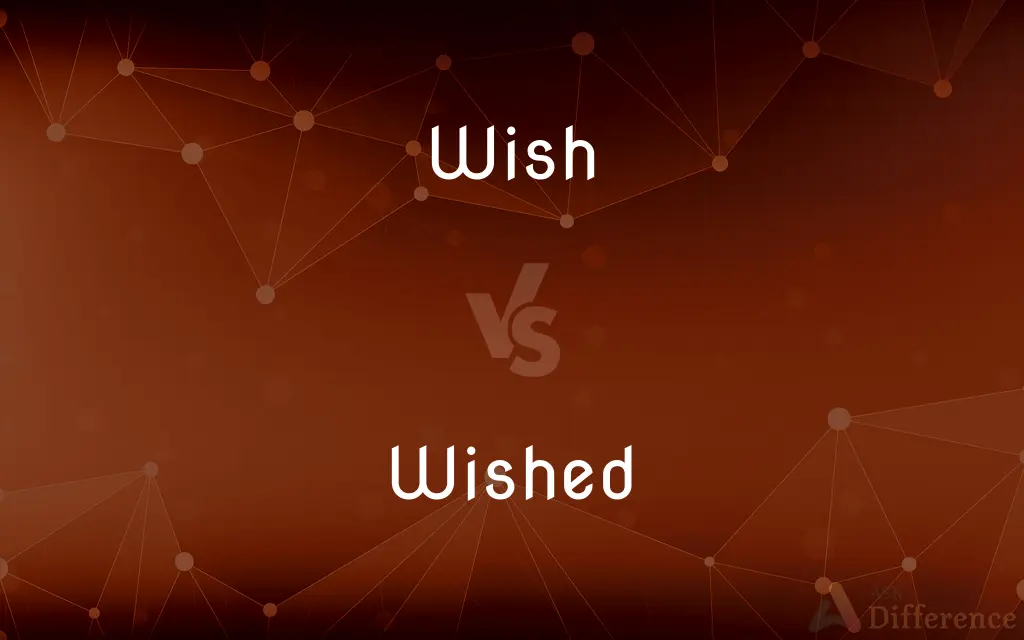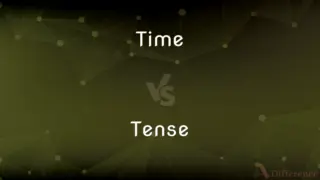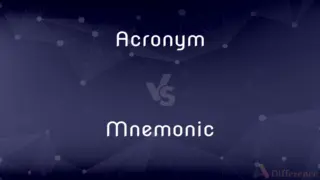Wish vs. Wished — What's the Difference?
By Fiza Rafique & Urooj Arif — Updated on March 28, 2024
"Wish" is the present tense form, expressing a desire for something not easily attainable; "wished" is the past tense, referring to desires previously expressed or felt.

Difference Between Wish and Wished
Table of Contents
ADVERTISEMENT
Key Differences
"Wish" is used to express a desire for something that is not currently true or is unlikely to happen in the present or future. It conveys a longing for different outcomes or situations, often reflecting unattainable or hypothetical scenarios. On the other hand, "wished" is the simple past tense of "wish," used to describe desires or hopes that were felt in the past. It indicates that the act of wishing has already occurred, often with a sense of reflection or nostalgia about what could have been.
In the context of grammar, "wish" serves as the base form of the verb, applicable in present tense constructions and when used with modal verbs to express hypotheticals or advice. For example, "I wish I had more time" uses "wish" to express a current desire. Conversely, "wished" fits into past tense narratives, signaling actions or feelings that have been completed, such as "She wished she had seen the signs sooner."
Usage also differs in conditional sentences. "Wish" is often paired with past tense verbs when expressing present or future desires, as in "I wish I were taller." This contrasts with "wished," which might be used in indirect speech or storytelling to recount past desires, e.g., "He wished he had been more careful."
The mood conveyed by "wish" and "wished" can vary significantly. "Wish" often carries a sense of longing or yearning for something different in the present or future, imbuing the sentence with a feeling of hope or desire. In contrast, "wished" can evoke a sense of regret or reflection, as it looks back on desires that were felt but perhaps not fulfilled.
Regarding interactions and expressions, "wish" is dynamic, actively involving the speaker in expressing current desires or hopes. It's forward-looking, despite the acknowledgment of unlikelihood. "Wished," on the other hand, tends to close a chapter, reflecting on past wishes with a finality that separates the wisher from the present possibility of those desires being realized.
ADVERTISEMENT
Comparison Chart
Tense
Present
Past
Function
Expresses current or future desires
Indicates past desires or hopes
Conditional Usage
Often used with past tense verbs in hypotheticals
Used in past narratives or indirect speech
Conveyed Mood
Implies hope, longing
Suggests reflection, sometimes regret
Example Sentence
"I wish I could fly."
"She wished she had taken the opportunity."
Interaction
Active expression of desire
Reflective, looking back on desires
Narrative Role
Introduces current hopes or hypothetical scenarios
Recounts or closes off past hopes and possibilities
Usage in Advice
Can be used to express hypothetical advice
Less common in advice, more in reflection
Associated Emotions
Hope, longing, desire
Regret, nostalgia, reflection
Compare with Definitions
Wish
To desire that something were different from the present.
I wish I were on vacation.
Wished
Expressed a desire or hope in the past that might not have been realized.
He wished he had worked harder.
Wish
In the subjunctive mood to express unreal situations.
I wish it were not so.
Wished
Reflected on past events with a sense of longing or regret.
They wished the night had never ended.
Wish
Expressing a hypothetical desire in the present or future.
I wish to visit Paris someday.
Wished
Used in storytelling to indicate a character's past desires.
She wished for a way to return home.
Wish
Used to politely request or express a desire for something.
I wish for silence.
Wished
Indicated politeness or formality in past interactions.
I wished them well before leaving.
Wish
Indicating a hope for someone else's fortune or well-being.
We wish you a happy birthday.
Wished
Recounted wishes in indirect speech.
She said she wished she could stay longer.
Wish
A wish is a hope or desire for something. In fiction, wishes can be used as plot devices.
Wished
A feeling that one would like to have or do something or to see something happen; a desire, longing, or strong inclination for a specific thing.
Wish
Feel or express a strong desire or hope for something that cannot or probably will not happen
He wished that he had practised the routines
We wished for peace
Wished
An expression of a desire, longing, or strong inclination
Carried out the wishes included in the will.
Wish
Want to do something
They wish to become involved
Wished
An expression of desire for the happiness or success of another
Sent me his best wishes.
Wish
Hope that (someone) has to deal with someone or something undesirable
He wouldn't wish Arthur on anyone
Wished
Something desired or longed for
Finally got his wish to see the ocean.
Wish
A desire or hope for something to happen
The union has reiterated its wish for an agreement
Her wish to be a mother
Wished
To long for; want.
Wish
A feeling that one would like to have or do something or to see something happen; a desire, longing, or strong inclination for a specific thing.
Wished
To feel or express a desire for
I wish them good luck. He wished her good night.
Wish
An expression of a desire, longing, or strong inclination
Carried out the wishes included in the will.
Wished
To order, entreat, or request
I wish you to go. I wish it to be known that I disagree.
Wish
An expression of desire for the happiness or success of another
Sent me his best wishes.
Wished
To desire (something bad) to happen to someone
I would not wish such an illness on anyone.
Wish
Something desired or longed for
Finally got his wish to see the ocean.
Wished
To have or feel a desire
Wish for a successful outcome.
Wish
To long for; want.
Wished
To express a wish.
Wish
To feel or express a desire for
I wish them good luck. He wished her good night.
Wished
Simple past tense and past participle of wish
Wish
To order, entreat, or request
I wish you to go. I wish it to be known that I disagree.
Wish
To desire (something bad) to happen to someone
I would not wish such an illness on anyone.
Wish
To have or feel a desire
Wish for a successful outcome.
Wish
To express a wish.
Wish
A desire, hope, or longing for something or for something to happen.
Have a wish
Make someone's wish come true
Wish
An expression of such a desire, often connected with ideas of magic and supernatural power.
Make a wish
Wish
The thing desired or longed for.
My dearest wish is to see them happily married.
Wish
(transitive) To desire; to want.
I'll come tomorrow, if you wish it.
Wish
To hope (+ object clause with may or in present subjunctive).
Wish
To hope (for a particular outcome), even if that outcome is unlikely to occur or cannot occur.
I wish I could go back in time and teach myself what I know now.
Wish
(ditransitive) To bestow (a thought or gesture) towards (someone or something).
We wish you a Merry Christmas.
Wish
To request or desire to do an activity.
Wish
(transitive) To recommend; to seek confidence or favour on behalf of.
Wish
To have a desire or yearning; to long; to hanker.
They cast four anchors out of the stern, and wished for the day.
This is as good an argument as an antiquary could wish for.
Wish
To desire; to long for; to hanker after; to have a mind or disposition toward.
I would not wishAny companion in the world but you.
I wish above all things that thou mayest prosper.
Wish
To recommend; to seek confidence or favor in behalf of.
I would be glad to thrive, sir,And I was wished to your worship by a gentleman.
Wish
Desire; eager desire; longing.
Behold, I am according to thy wish in God a stead.
Wish
Expression of desire; request; petition; hence, invocation or imprecation.
Blistered be thy tongue for such a wish.
Wish
A thing desired; an object of desire.
Will he, wise, let loose at once his ire . . . To give his enemies their wish!
Wish
A specific feeling of desire;
He got his wish
He was above all wishing and desire
Wish
An expression of some desire or inclination;
I could tell that it was his wish that the guests leave
His crying was an indirect request for attention
Wish
(usually plural) a polite expression of desire for someone's welfare;
Give him my kind regards
My best wishes
Wish
The particular preference that you have;
It was his last wish
They should respect the wishes of the people
Wish
Hope for; have a wish;
I wish I could go home now
Wish
Prefer or wish to do something;
Do you care to try this dish?
Would you like to come along to the movies?
Wish
Have in mind;
I will take the exam tomorrow
Wish
Make or express a wish;
I wish that Christmas were over
Wish
Feel or express a desire or hope concerning the future or fortune of
Wish
Order politely; express a wish for
Wish
Invoke upon;
Wish you a nice evening
Bid farewell
Common Curiosities
How do "wish" and "wished" interact with the subjunctive mood?
Both can be used with the subjunctive to express desires: "wish" for current hypotheticals, "wished" for past.
Can "wished" express regret?
Yes, "wished" often conveys a sense of reflection or regret about past desires that were not fulfilled.
What is the grammatical difference between "wish" and "wished"?
"Wish" is the present tense form used for current or future desires, while "wished" is the past tense form for expressing past desires.
Can "wish" and "wished" be used interchangeably?
No, their use depends on the time frame of the desire: "wish" for present or future, and "wished" for past.
Can "wish" be used to express polite requests?
Yes, "wish" can express polite requests or desires, often in formal contexts.
How do cultural expressions of wishing differ between "wish" and "wished"?
"Wish" often features in expressions of current hopes or traditions (e.g., wishing wells), while "wished" might appear in reflective narratives or traditions recalling past hopes.
Is it correct to use "wish" in a past tense sentence?
Generally, no. "Wished" should be used for past desires, unless reporting speech or thoughts contemporaneous with the past action.
Can "wish" and "wished" be used in conditional sentences?
Yes, both can be used in conditional sentences appropriate to their tense to express desires contingent on hypothetical situations.
Is it possible to use "wish" in a future context?
While "wish" is present tense, it can express future desires in the form of current hopes for future outcomes.
Are there any exceptions to the tense rules for "wish" and "wished"?
Tense usage is generally consistent, but creative writing and indirect speech can sometimes blur these boundaries.
How does context affect the use of "wish" and "wished"?
Context determines tense and mood: "wish" for present/future desires, "wished" for past or indirect speech recounting past desires.
How do "wish" and "wished" affect the tone of a sentence?
"Wish" implies a hopeful or longing tone for the present or future, while "wished" can add a reflective or regretful tone to past contexts.
What is the subjunctive mood's role with "wish" and "wished"?
The subjunctive mood is used with both to express wishes or desires about hypothetical or unreal situations.
Can "wished" imply fulfilled desires?
Rarely. "Wished" typically conveys desires that were felt in the past, without necessarily implying they were fulfilled.
How do "wish" and "wished" relate to desire and reality?
Both terms express a gap between desire and reality; "wish" looks to bridge this gap in the present or future, while "wished" acknowledges it in the past.
Share Your Discovery

Previous Comparison
Time vs. Tense
Next Comparison
Acronym vs. MnemonicAuthor Spotlight
Written by
Fiza RafiqueFiza Rafique is a skilled content writer at AskDifference.com, where she meticulously refines and enhances written pieces. Drawing from her vast editorial expertise, Fiza ensures clarity, accuracy, and precision in every article. Passionate about language, she continually seeks to elevate the quality of content for readers worldwide.
Co-written by
Urooj ArifUrooj is a skilled content writer at Ask Difference, known for her exceptional ability to simplify complex topics into engaging and informative content. With a passion for research and a flair for clear, concise writing, she consistently delivers articles that resonate with our diverse audience.
















































